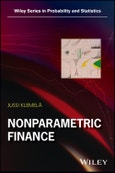An Introduction to Machine Learning in Finance, With Mathematical Background, Data Visualization, and R
Nonparametric function estimation is an important part of machine learning, which is becoming increasingly important in quantitative finance. Nonparametric Finance provides graduate students and finance professionals with a foundation in nonparametric function
estimation and the underlying mathematics. Combining practical applications, mathematically rigorous presentation, and statistical data analysis into a single volume, this book presents detailed instruction in discrete chapters that allow readers to dip in as needed without reading from beginning to end.
Coverage includes statistical finance, risk management, portfolio management, and securities pricing to provide a practical knowledge base, and the introductory chapter introduces basic finance concepts for readers with a strictly mathematical background. Economic significance
is emphasized over statistical significance throughout, and R code is provided to help readers reproduce the research, computations, and figures being discussed. Strong graphical content clarifies the methods and demonstrates essential visualization techniques, while deep mathematical and statistical insight backs up practical applications.
Written for the leading edge of finance, Nonparametric Finance:
- Introduces basic statistical finance concepts, including univariate and multivariate data analysis, time series analysis, and prediction
- Provides risk management guidance through volatility prediction, quantiles, and value-at-risk
- Examines portfolio theory, performance measurement, Markowitz portfolios, dynamic portfolio selection, and more
- Discusses fundamental theorems of asset pricing, Black-Scholes pricing and hedging, quadratic pricing and hedging, option portfolios, interest rate derivatives, and other asset pricing principles
- Provides supplementary R code and numerous graphics to reinforce complex content
Nonparametric function estimation has received little attention in the context of risk management and option pricing, despite its useful applications and benefits. This book provides the essential background and practical knowledge needed to take full advantage of these little-used methods, and turn them into real-world advantage.
Jussi Klemelä, PhD, is Adjunct Professor at the University of Oulu. His research interests include nonparametric function estimation, density estimation, and data visualization. He is the author of Smoothing of Multivariate Data: Density Estimation and Visualization and Multivariate Nonparametric Regression and Visualization: With R and Applications to Finance.
Table of Contents
Preface xxiii
1 Introduction 1
1.1 Statistical Finance 2
1.2 Risk Management 3
1.3 Portfolio Management 5
1.4 Pricing of Securities 6
Part I Statistical Finance 11
2 Financial Instruments 13
2.1 Stocks 13
2.2 Fixed Income Instruments 19
2.3 Derivatives 23
2.4 Data Sets 27
3 Univariate Data Analysis 33
3.1 Univariate Statistics 34
3.2 Univariate Graphical Tools 42
3.3 Univariate ParametricModels 55
3.4 Tail Modeling 61
3.5 Asymptotic Distributions 83
3.6 Univariate Stylized Facts 91
4 Multivariate Data Analysis 95
4.1 Measures of Dependence 95
4.2 Multivariate Graphical Tools 103
4.3 Multivariate ParametricModels 107
4.4 Copulas 111
5 Time Series Analysis 121
5.1 Stationarity and Autocorrelation 122
5.2 Model Free Estimation 128
5.3 Univariate Time Series Models 135
5.4 Multivariate Time Series Models 157
5.5 Time Series Stylized Facts 160
6 Prediction 163
6.1 Methods of Prediction 164
6.2 Forecast Evaluation 170
6.3 Predictive Variables 175
6.4 Asset Return Prediction 182
Part II Risk Management 193
7 Volatility Prediction 195
7.1 Applications of Volatility Prediction 197
7.2 Performance Measures for Volatility Predictors 199
7.3 Conditional Heteroskedasticity Models 200
7.4 Moving Average Methods 205
7.5 State Space Predictors 211
8 Quantiles and Value-at-Risk 219
8.1 Definitions of Quantiles 220
8.2 Applications of Quantiles 223
8.3 Performance Measures for Quantile Estimators 227
8.4 Nonparametric Estimators of Quantiles 233
8.5 Volatility Based Quantile Estimation 240
8.6 Excess Distributions in Quantile Estimation 258
8.7 Extreme ValueTheory in Quantile Estimation 288
8.8 Expected Shortfall 292
Part III Portfolio Management 297
9 Some Basic Concepts of Portfolio Theory 299
9.1 Portfolios and Their Returns 300
9.2 Comparison of Return andWealth Distributions 312
9.3 Multiperiod Portfolio Selection 326
10 Performance Measurement 337
10.1 The Sharpe Ratio 338
10.2 Certainty Equivalent 346
10.3 Drawdown 347
10.4 Alpha and Conditional Alpha 348
10.5 Graphical Tools of Performance Measurement 356
11 Markowitz Portfolios 367
11.1 Variance Penalized Expected Return 369
11.2 Minimizing Variance under a Sufficient Expected Return 372
11.3 Markowitz Bullets 375
11.4 Further Topics in Markowitz Portfolio Selection 381
11.5 Examples of Markowitz Portfolio Selection 383
12 Dynamic Portfolio Selection 385
12.1 Prediction in Dynamic Portfolio Selection 387
12.2 Backtesting Trading Strategies 393
12.3 One Risky Asset 394
12.4 Two Risky Assets 405
Part IV Pricing of Securities 419
13 Principles of Asset Pricing 421
13.1 Introduction to Asset Pricing 422
13.2 Fundamental Theorems of Asset Pricing 430
13.3 Evaluation of Pricing and Hedging Methods 456
14 Pricing by Arbitrage 459
14.1 Futures and the Put–Call Parity 460
14.2 Pricing in Binary Models 466
14.3 Black–Scholes Pricing 485
14.4 Black–Scholes Hedging 505
14.5 Black–Scholes Hedging and Volatility Estimation 515
15 Pricing in IncompleteModels 521
15.1 Quadratic Hedging and Pricing 522
15.2 Utility Maximization 523
15.3 Absolutely Continuous Changes of Measures 530
15.4 GARCH Market Models 534
15.5 Nonparametric Pricing Using Historical Simulation 545
15.6 Estimation of the Risk-Neutral Density 551
15.7 Quantile Hedging 555
16 Quadratic and Local Quadratic Hedging 557
16.1 Quadratic Hedging 558
16.2 Local Quadratic Hedging 583
16.3 Implementations of Local Quadratic Hedging 595
17 Option Strategies 615
17.1 Option Strategies 616
17.2 Profitability of Option Strategies 625
18 Interest Rate Derivatives 649
18.1 Basic Concepts of Interest Rate Derivatives 650
18.2 Interest Rate Forwards 659
18.3 Interest Rate Options 666
18.4 Modeling Interest Rate Markets 669
References 673
Index 681








